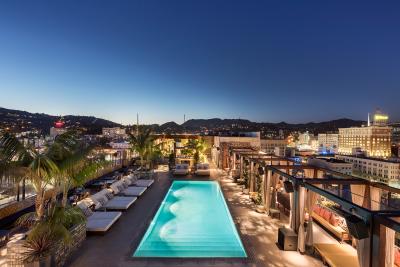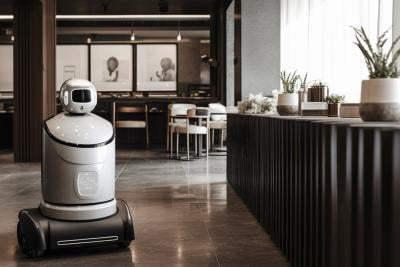Sustainability technologies developed for hotel management and maintenance have proliferated since 2020, the year the UK Hospitality/CGA Future Shock Report declared sustainability to be “the issue of our time.” Travelers are likely to consider a hotel’s sustainability efforts equally as important as tangible amenities and services. Sustainability investments can improve financial performance while delivering new commercial opportunities and bolstering a brand’s reputation.
Sustainability Standards
Jeff Smith, vice president of sustainability at Six Senses, an IHG Hotels & Resorts company, believes implementing the right combination of sustainability technologies is not so much a one-size-fits-all approach as it is an evaluation of which ones can be customized to meet the specific needs of any given location.
“We have some minimum standards, such as composting at all locations,” Smith said. “Drinking water is another focus because of the vast increase in efficiency we can realize by bottling the water ourselves. [Another] priority of growing importance for us is renewable energy production. With these standards, and all new hotels reaching LEED Silver certification as a minimum standard, we are reaching a plateau on viable efficiency measures. The next step forward will be generating our own supply of green energy.”
The best approach to getting Dream Hollywood onto the sustainability superhighway, according to managing director Vaughn Davis, was to go all-in by implementing numerous technologies once the best products for the property were thoroughly vetted. As the Los Angeles hotel was built and opened in 2017 as a LEED Silver property, it made sense for Davis and his team to keep the momentum going.

“It was extremely important to have energy-efficient lighting in all of our rooms throughout the property in place during a part of our pre-opening process,” Davis shared. “We continue to take sustainability very seriously. [Our rooftop] has a hydraulic pool floor that raises up to extend the functional square footage of the space for any special events. Water dispels off the side of the pool and goes into valleys that sit in a reservoir underneath the pool as it's raised.”
Maximizing Efficiency
Marianne Balfe, vice president of sustainability at real estate investment and hospitality management company Highgate, points to its Alohilani Resort in Waikiki—one of its most sustainably minded properties—as an example of why it is best to implement sustainability practices with the long term in mind. “Highgate’s sustainability standards and bonus incentive program push its hotel leaders to maximize their energy efficiency through initiatives for installing 100 percent LED lighting, smart guest room thermostats, automated lighting controls, variable frequency drives, innovative laundry systems, and smart kitchen hood fans.”

“Generally, projects with the most advantageous financial and environmental impacts are tackled first,” she continued. “However, with the progressive step-down of energy and water conservation rebate programs, we also prioritize projects with available incentives to maximize rebate utilization. This is also a consideration when looking at large capital expenditures; waiting until the system fails can render it ineligible for rebates. Another big sustainability technology push across our portfolio is installing EV charging stations to provide guests with this important green transportation amenity.”
Small Changes, Big Impacts
Changes at individual properties within major hotel groups illustrate how even a small ripple can lead to a wave when implementing changes in sustainable operations practices. Jean Garris Hand, Hilton’s vice president of global ESG, cites the example of the Arizona Biltmore in Phoenix upgrading its lighting to energy-efficient LED technology. The property-wide lighting project is expected to reduce electric usage by nearly 30 percent from the 2019 baseline and achieve a 2.9-year payback, accelerated by $100,000 in utility incentives. The project also highlights the wide array of LED capabilities from specialty bar lighting to lobbies and candelabra.
“By 2025, all of Hilton’s properties worldwide will have completed a full transition to LED lighting where there are simple bulb change outs,” said Garris Hand. “Changing light bulbs is the most common request received by engineering teams at our hotels; as LEDs have a significantly longer lifespan than traditional light bulbs. This transition will also save team members’ time that they can use to focus on other decarbonization efforts.”
Artificial Intelligence, Real Results
Rafael Ibarcena, McKibbon Hospitality’s corporate sustainability manager, can readily list numerous technologies and applications the company has adopted to ensure each hotel and resort runs with a level of operational sustainability that its clientele values. He affirms that the extensive use of AI-based technology guarantees consistency in how each technology works separately and in tandem with others.
“AI is having a significant impact in the area of predictive maintenance since AI analysis can predict equipment failures, allowing for preventative maintenance and reducing downtime,” Ibarcena explained. “Predictive maintenance with AI will extend the useful life and improve the performance of equipment and machines. AI-powered water monitoring and control systems make it possible to analyze water consumption patterns and identify potential leaks, which help hotels conserve water resources and reduce drinking water and sewer costs.”
Other use-case scenerios include:
- Energy management systems and AI-powered heating, ventilation, and air conditioning (HVAC) systems can be optimized based on occupancy patterns, weather forecasts and energy prices to reduce hotel energy consumption.
- AI-controlled smart lighting systems allow the adjustment of brightness and color temperature based on natural light conditions and occupancy, saving energy and providing an experience tailored to guest preferences.
- Robotic and AI-based occupancy sensors monitor guest movement, enabling more efficient control of lighting and HVAC systems.
- AI-powered chatbots and virtual assistants handle routine guest queries, reducing the need for printed materials.
- Robots equipped with AI vision systems can take images of dumpsters and calculate garbage volume as well as classify the garbage to ensure adequate recycling.

AI systems have almost limitless potential in the Tampa, Fla.-based firm’s hospitality operations, said Ibarcena. “Garbage cans with built-in scales connected to AI solutions make it possible to quantify and classify the volumes of food waste generated in hotel kitchens. It helps reduce waste volumes and quantifies the amount of organic waste that can serve as compost. It can optimize food inventory levels, reducing food waste by more accurately predicting demand patterns and food expiration dates.”
Notable Numbers
- Hilton property Hotel Marcel in New Haven, Conn. runs on 100 percent renewable electricity, making it fossil-fuel free. It has more than 1,000 solar panels installed, creating a new standard that demonstrates that sustainable operations can enhance the guest experience.
- McKibbon Hospitality supports its accounting operations with M3 software, a cloud-based financial platform and services company serving around 8,000 hotels in North America. This software reduces the need for on-site servers and reduce energy consumption.
- DigiTally stocktaking software combines weighing scales with a tablet. “The cost prices of each product, recipes and their weights appear in the background,” said founder Patrick McDermott. “The app allows the user to record all food waste and see why it’s happening, whether something is out of date, over-produced, or plate waste.” Customers reduced food waste by up to 72 percent, saved up to 25 hours worth of labor and saw an average increase of up to 8 percent in profits using the software.
- Highgate uses ENGIE’s “Ellipse” carbon emissions tracking platform, which tracks the effectiveness of items the company purchased, such as the Green-e certified renewable energy certificates in 2022, to power over 200 of its hotels with 100 percent renewable energy.
